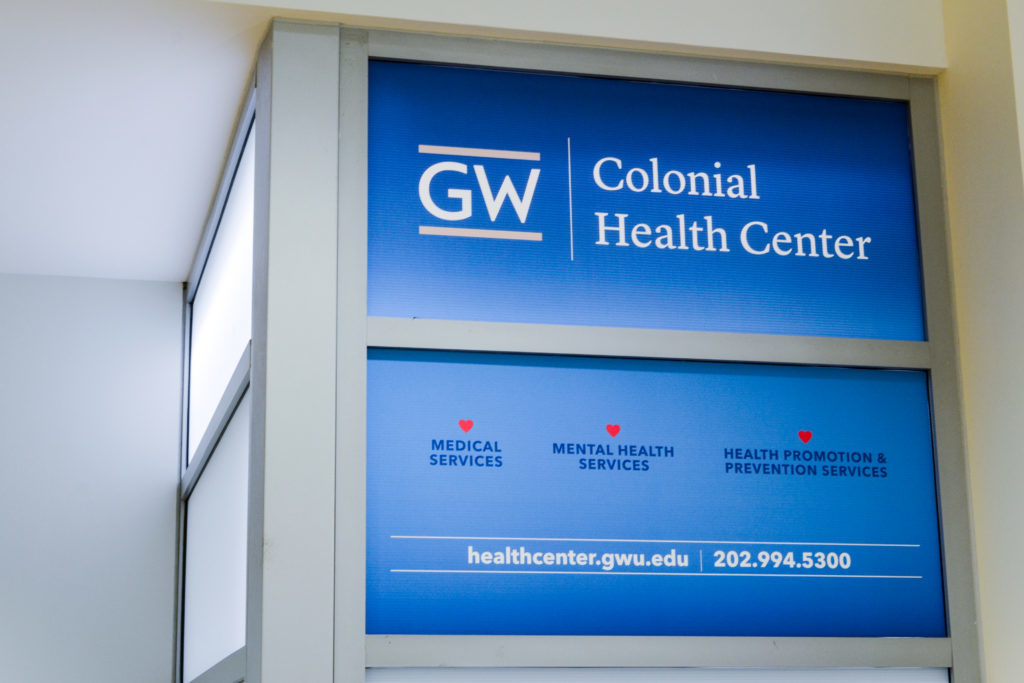Student use of free monthly HIV testing at the student health center doubled from October to November this year, attracting more than 30 students to the clinic in one day.
A drive to advertise the free testing at the Colonial Health Center on social media platforms like Facebook and Twitter led to an uptick in students attending the clinics, officials said. The increase came after the CHC partnered with Voices for Choices, a pro-choice student advocacy campus organization, to boost advertising efforts and student awareness of testing.
Experts who study HIV said testing is crucial for students who are concerned that they’re HIV positive because early treatment can lessen the devastating impacts of the disease.
Free HIV testing was first offered for students on a weekly basis in 2012, following a record-high year for testing when 711 students were tested in the health center. But participation dropped in 2013 when only 95 students attended tests for the entire year and officials decided to only hold clinics at the CHC once a month.
All HIV testing is currently free at the CHC regardless of whether a student attends one of the monthly clinics or not. But the CHC dedicates the first Wednesday of every month to free HIV testing to increase student turnout.
Isabel Goldenberg, the director of the Student Health Service, said recent advertising and promotion made a major impact on the amount of students getting tested during free clinic day. Because only about one-third of young adults are tested, Goldenberg said it is important to encourage participation in free clinics.
“As with many outreach and health promotion incentives, the free testing program days raises awareness of HIV and helps to promote healthy lifestyle choices and behaviors,” Goldenberg said in an email.
Goldberg said the CHC averages around 300 to 400 HIV tests a year. About 25 percent of these tests occur during the monthly clinic, she said.
Jennifer Peterson, the programming chair of Voices for Choices, a pro-choice student organization, said November was the first month that the organization partnered with the CHC to advertise and volunteer in the monthly clinics. She said discussions started with officials at the health center in late September.
“We think it’s a great opportunity that students should take advantage of more and be in charge of their sexual health,” she said. “We just really wanted to promote what they were already doing and something they already offered.”
Peterson said the group promoted the HIV testing clinic through social media to increase the amount of students getting tested. Five members of the organization also volunteered during the clinic to help guide students to where the tests were administered and wait with patients.
Jenna Presta, the co-president of Voices for Choices, said more than 30 students had been tested this month on the Nov. 1 testing date, about twice as much as the norm. She said the organization planned on returning again in December to help administer the tests after the success this month.
“Back in the 80s getting HIV was practically a death sentence,” Presta said. “It’s not like that anymore if it’s treated properly, but you have to catch it. I strongly encourage people to get tested.”
Researchers specializing in HIV research at GW said increasing awareness of and accessibility to free HIV testing was a step in the right direction for the student health center. They added that expanding awareness of testing and treatment for the disease could improve treatment outcomes for affected students.
Alberto Bosque-Pardos, an assistant professor in the department of microbiology, tropical medicine and immunology, said being tested early is an important factor in determining how effective treatment is for HIV-positive individuals.
“In the case of HIV there is a big proportion of people who don’t know that they are infected and being able to be tested also allows you to be treated as soon as possible,” he said.
He added that knowing where and when testing is available, as well as the cost, could help students become aware of the disease and feel comfortable in going to find out whether or not they may be HIV-positive.
“Nowadays I think that everyone is aware of the disease and the infection and I think having that ability always helps,” Bosque-Pardos said. “I can see it as similar to getting the flu vaccine. It is available and if people know that they can get it, more people will get the flu vaccine.”
Sarah Calabrese, an assistant professor of clinical psychology, said the increase in testing could also be an opportunity for the University to educate students on prevention and treatment regardless of their test results. She added that the CHC could also educate students coming in for testing about preventative medication like PrEP, a drug for patients who do not have HIV but are at risk of contracting it, which can reduce the chances of infection.
“If someone tests HIV negative, I think that’s an opportunity to educate people about the prevention options that are available,” Calabrese said.





